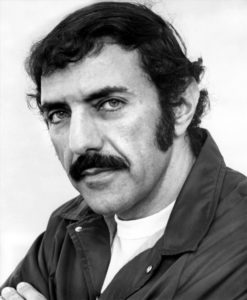Arab Americans
William Peter Blatty

William Peter Blatty (January 7, 1928 – January 12, 2017) was an American writer and filmmaker best known for his 1971 novel The Exorcist and for the Academy Award-winning screenplay of its film adaptation. He also wrote and directed the sequel The Exorcist III.
Born and raised in New York City, Blatty received his bachelor’s degree in english from the Georgetown University in 1950, and his master’s degree in english literature from the George Washington University in 1954. Some of his other notable works are the novels Elsewhere (2009), Dimiter (2010) and Crazy (2010).
Blatty was born in New York City, on January 7, 1928, the fifth and youngest child of Lebanese immigrants Mary (née Mouakad), a devout Catholic and the niece of a bishop and Peter Blatty, a cloth cutter. His father left home when William was six years old. He was raised in what he described as “comfortable destitution” by his deeply religious Catholic mother, whose sole support came from peddling homemade quince jelly in the streets of Manhattan; she once offered a jar of it to Franklin D. Roosevelt when the President was cutting the ribbon for the Queens–Midtown Tunnel, telling him, “For when you have company.” He lived at 28 different addresses during his childhood because of nonpayment of rent. “We never lived at the same address in New York for longer than two or three months at a time,” Blatty told The Washington Post in 1972. “Eviction was the order of the day.” Blatty’s mother died in 1967.
He attended Brooklyn Preparatory, a Jesuit school, on scholarship and graduated as class valedictorian in 1946, and later attended Georgetown University on a scholarship, where he earned his bachelor’s degree in English in 1950. While studying for his master’s degree at George Washington University, Blatty took menial jobs. Initially unable to find a job in teaching, he worked as a vacuum cleaner door-to-door salesman, as a beer truck driver, and as a United Airlines ticket agent. Blatty earned his master’s in English literature from the George Washington University in 1954. He then enlisted in the United States Air Force, where he ultimately became head of the Policy Branch of the USAF Psychological Warfare Division.
Mustering out of the Air Force, he joined the United States Information Agency and worked as an editor based in Beirut, Lebanon, about which he would write in his humorous autobiography Which Way to Mecca, Jack?.
In the 1950s, Blatty worked as the public relations director at Loyola University of Los Angeles and as the Director of Publicity at the University of Southern California. Blatty published his first book, Which Way to Mecca, Jack? in 1960, which dealt humorously with both his early life and his work at the United States Information Agency in Lebanon. In 1961, while still working in public relations, Blatty appeared as a contestant on the Groucho Marx quiz show You Bet Your Life, winning $10,000, enough money to quit his job and to write full time. Thereafter, he never held a regular job again.
He then published the comic novels John Goldfarb, Please Come Home! (1963), I, Billy Shakespeare (1965) and Twinkle, Twinkle, “Killer” Kane (1966). He achieved critical success with these books – Marvin Levin in the New York Times, for example, wrote: “Nobody can write funnier lines than William Peter Blatty, a gifted virtuoso who writes like [S. J.] Perelman” –, but popular sales were lacking.
It was at this point that Blatty began a collaboration with director Blake Edwards, writing scripts for comedy films such as A Shot in the Dark (1964), What Did You Do in the War, Daddy? (1966), Gunn (1967), and Darling Lili (1970), a musical starring Julie Andrews and Rock Hudson. Without Edwards, Blatty also worked on comedy screenplays as “Bill Blatty”, two such credits being the Danny Kaye film The Man from the Diners’ Club (1963) and the Warren Beatty/Leslie Caron film Promise Her Anything (1965). Others were the film adaptation of John Goldfarb, Please Come Home! (1965) and The Great Bank Robbery (1969).
Later Blatty resumed novel-writing. Blatty wrote The Exorcist in 1971, a story about a twelve-year-old girl being possessed by a powerful demon, that topped The New York Times bestseller list for 17 weeks and remained on the list for 57 consecutive weeks. The book sold more than 13 million copies in the United States alone and was translated into over a dozen languages. It was later adapted by himself and director William Friedkin into the film version. Blatty went on to win an Academy Award for his Exorcist screenplay, as well as Golden Globes for Best Picture and Best Writing. It also became the first ever horror film to be nominated for the best picture Oscar.
In 1978, Blatty adapted his novel Twinkle, Twinkle, “Killer” Kane into the retitled The Ninth Configuration, and in 1980 he wrote, directed and produced a film version, which focused on the question of the existence of God. The film was a commercial flop despite critical acclaim. The movie critic Jerry Stein reviewed it as a “masterpiece” in The Cincinnati Post and Peter Travers described it as “the finest large-scale American surrealist film ever made” in People magazine. In 1981 it was nominated for three Golden Globes, and won the Best Writing Award against competition that included The Elephant Man (1980), Ordinary People (1980) and Raging Bull (1980).
In 1983, Blatty wrote Legion, a sequel to The Exorcist which later became the basis of the film The Exorcist III. At first he was unable to set up the production because he wanted to direct the film. Blatty’s agent, Steve Jaffe, helped package the project with producer Carter DeHaven at Morgan Creek Productions. Blatty directed the film. He originally wanted the movie version to be titled Legion, but the film producers wanted it to be more closely linked to the original. The first sequel, Exorcist II: The Heretic (1977), was disappointing both critically and commercially. Blatty had no involvement in this first sequel and his own follow-up ignored it entirely.
Blatty’s son Peter Vincent Blatty died from a rare heart disorder in 2006 at the age of 19. His death was the subject of Blatty’s non-fiction book that is “part comic memoir, part argument for life after death”, titled, Finding Peter: A True Story of the Hand of Providence and Evidence of Life After Death (2015).
In 2011, The Exorcist was re-released as a 40th Anniversary Edition in paperback, hardcover and audiobook editions with differing cover artwork. This new, updated edition featured new and revised material: “The 40th Anniversary Edition of The Exorcist will have a touch of new material in it as part of an all-around polish of the dialogue and prose. First time around I never had the time (meaning the funds) to do a second draft, and this, finally, is it. With forty years to think about it, a few little changes were inevitable – plus one new character in a totally new very spooky scene. This is the version I would like to be remembered for.” Tor/Forge have also re-published The Ninth Configuration and Legion, respectively, with new, updated cover artwork.
The Exorcist was eventually adapted into a TV mini-series (2016), starring Richard Chamberlain and Brooke Shields. It debuted on Fox in 2016. The series first premiered in Los Angeles in 2012. Internationally, the series premiered in Brazil on FX on September 23, 2016, the same day as in the U.S. It premiered in Australia on showcase on December 4, 2016.
Blatty married four times and had seven children. With his first wife, Mary Margaret Rigard, whom he married on February 18, 1950, he had three children: Christine Ann, Michael Peter and Mary Joanne. His first marriage ended in an annulment. His second wife was Elizabeth Gilman, whom he married in 1950. His third wife was tennis professional Linda Tuero (married in July 1975) with whom he had two children. Following the dissolution of his first three marriages, Blatty married Julie Alicia Witbrodt, his fourth wife, in 1983, by whom he had two children. The couple remained together until Blatty’s death in 2017. After residing many years in Hollywood and Aspen, Blatty settled in Bethesda, Maryland in 2000.
Blatty died of multiple myeloma on January 12, 2017, at a hospital in Bethesda, five days after his 89th birthday. Survivors include his wife, Julie Witbrodt Blatty; three daughters, two sons, seven grandchildren and six great-grandchildren.
Blatty was a Roman Catholic.
Studies of Blatty’s work include G. S. J. Barclay’s Anatomy of Horror: The Masters of Occult Fiction. Critical essay on Blatty’s work include Douglas E. Winter’s essay in A Dark Night’s Dreaming: Contemporary American Horror Fiction and S. T. Joshi’s essay “William Peter Blatty: The Catholic Weird Tale” in The Modern Weird Tale: A Critique of Horror Fiction (2001). Essays studying all Blatty’s novels can be found in Benjamin Szumskyj’s American Exorcist: Critical Essays on William Peter Blatty (McFarland, 2008).
Awards
- The Commonwealth Club Silver Medal for Literature (The Exorcist)
- The Gabriel Award and American Film Festival Blue Ribbon for Insight TV series episode “Watts Made Out of Thread?”
- Saturn Awards for The Exorcist, The Ninth Configuration and The Exorcist III
- The People’s Choice Award for the Oscars – Best Picture Award for The Exorcist
- The Horror Writers Association Lifetime Achievement Award
- Academy Award, Best Adapted Screenplay (The Exorcist)
- Golden Globe, Best Screenplay (The Ninth Configuration)
- Golden Globe, Best Picture (The Exorcist)
- Golden Globe, Best Screenplay (The Exorcist)
- M. B. K. Winner of 2000 Audie Award Solo Narration by the Author
- Winner of AUDIOFILE Earphones Award
Bibliography
Novels
- Which Way to Mecca, Jack? (1959)
- John Goldfarb, Please Come Home! (1963)
- I, Billy Shakespeare (1965)
- Twinkle, Twinkle, “Killer” Kane (1966)
- The Exorcist (1971)
- The Ninth Configuration (1978)
- Legion (1983)
- Demons Five, Exorcists Nothing: A Fable (1996)/Revised and re-released in 2013, retitled Demons Five, Exorcists Nothing: A Hollywood Christmas Carol
- Elsewhere (2009) – Originally published as a novella in 1999 in Al Sarrantonio’s 999: New Stories of Horror and Suspense anthology
- Dimiter (2010) / Revised and re-released in 2013; also published under the title The Redemption
- Crazy (2010)
- The Exorcist for the 21st Century (2016)
Novelizations of Blatty’s screenplays by others, paperback editions only
- Boal, Sam (1963). The Man from the Diner’s Club. Lancer Books. ASIN B000BREO5E.
- Fenton, Edward (as “Henry Clement”) (1970). Darling Lili. Signet Books. ISBN 0451042166.
- Hine, Al (as “Bradford Street”) (1965). Promise Her Anything. Dell Publishing. ASIN B000MPR0I8.
Autobiography
- Blatty, William Peter (1974). I’ll Tell Them I Remember You. Barrie & Jenkins. ISBN 978-0-214-20016-8.
Nonfiction
- Blatty, William Peter (1974). William Peter Blatty on ‘The Exorcist’: From Novel to Screen. Bantam Books. ISBN 0553086871.
- Blatty, William Peter (2001). If There Were Demons Then Perhaps There Were Angels: William Peter Blatty’s Own Story of the Exorcist. Screenpress Books. ISBN 1901680347.
- Blatty, William Peter (2015). Finding Peter: A True Story of The Hand of Providence and Evidence of Life After Death. Regnery Publishing. ISBN 162157332X.
Filmography
Screenplays
- The Man from the Diners’ Club (1963)
- A Shot in the Dark (1964; co-screenplay)
- John Goldfarb, Please Come Home! (1965)
- Promise Her Anything (1965)
- What Did You Do in the War, Daddy? (1966)
- Gunn (1967 – co-screenplay)
- The Great Bank Robbery (1969)
- Darling Lili (1970 – co-screenplay)
- The Exorcist (1973)
- Mastermind (1976 as “Terence Clyne”)
- The Ninth Configuration (1980)
- The Exorcist III (1990)
Director
- The Ninth Configuration (1980)
- The Exorcist III (1990)
Producer
- The Exorcist (1973)
- The Ninth Configuration (1980)
Source: Wikipedia


